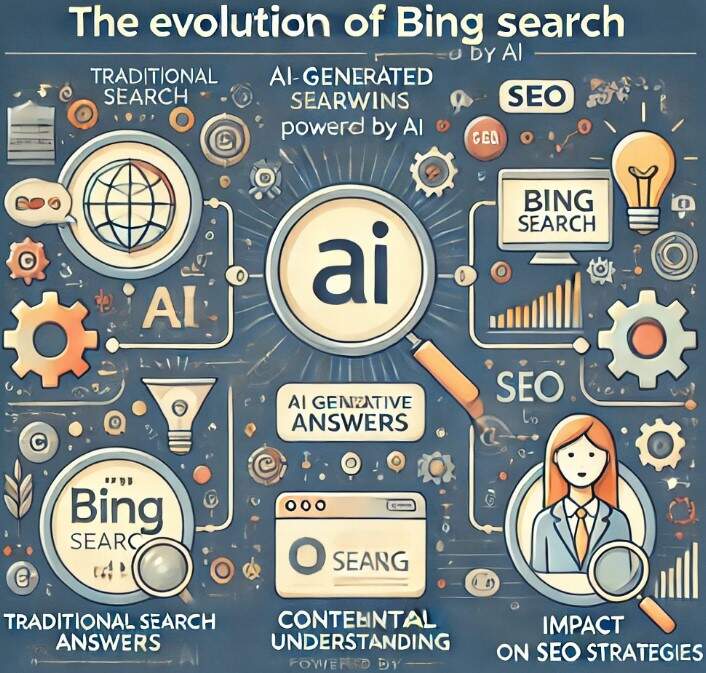Understanding Bing Generative Search and Its Impact on SEO
Published on September 10, 2024

Understanding Bing Generative Search and Its Impact on SEO
Introduction
As AI technology rapidly evolves, major search engines like Bing are embracing generative AI to enhance search capabilities. Bing Generative Search is one of the latest advances in this direction, designed to provide users with more comprehensive, context-rich, and relevant answers. This new tool has profound implications for SEO, fundamentally shifting the way businesses and websites approach search optimization.
In this guide, we’ll explain what Bing Generative Search is, how it works, and how it impacts SEO strategies. As you’ll see, keeping up with this evolving search technology will be essential for successful SEO in the near future.
What is Bing Generative Search?
Bing Generative Search leverages AI models to understand search queries more deeply and provide detailed, human-like responses. Instead of merely providing a list of links, this AI-powered search format generates summaries, insights, and context, aiming to give users complete answers within the search results. It’s similar to how ChatGPT operates, except this system is specifically tailored for search applications.
How Does Bing Generative Search Work?
Using large language models, Bing Generative Search interprets search queries, breaking them down into various intents and meanings. The system then processes this information, scanning its vast database and compiling information into a coherent response, often embedding links and resources directly within the summary. The objective is to provide users with a detailed answer quickly, without needing to sift through multiple web pages.
How Bing Generative Search Affects SEO
The introduction of Bing Generative Search is changing the traditional approach to SEO. Here are several ways it impacts digital marketing strategies:
- Emphasis on High-Quality, Informative Content: With Bing’s generative approach, content quality and relevancy are more important than ever. Bing's AI is trained to prioritize detailed, well-structured content that answers common questions clearly and comprehensively. Businesses need to focus on producing high-value, in-depth articles that address user intent effectively.
- Fewer Click-Through Opportunities: Generative Search provides answers directly within the search results, which may reduce the need for users to click through to external sites. This shift means that traditional metrics like click-through rates (CTR) might decrease. To counteract this, focus on providing value directly in search results and encouraging users to visit for in-depth insights.
- Importance of E-E-A-T (Experience, Expertise, Authoritativeness, and Trustworthiness): As search engines prioritize authoritative and reliable information, E-E-A-T becomes crucial. Generative search engines like Bing favor content from credible sources. By emphasizing trustworthiness, expertise, and accuracy in your content, you can increase the chances of being included in Bing’s response summaries.
- Optimizing for Bing-Specific Keywords: While Google has been the primary focus of most SEO efforts, the rise of Bing Generative Search is increasing the value of optimizing for Bing as well. Bing users often have different demographics and behaviors, and keywords optimized specifically for Bing may yield better results.
- Leveraging Structured Data for Context: Structured data provides additional context that Bing’s AI can use to understand and categorize your content effectively. Implementing structured data is one of the best ways to improve your chances of being featured in Bing’s generative answers.
- Voice Search Optimization and Conversational Queries: AI-powered search tools are more likely to interpret and respond to conversational language. Content that includes natural, question-based keywords and optimizes for voice search will be better aligned with Bing Generative Search’s AI model.
- Increased Importance of Technical SEO: For Bing to accurately crawl and index your content, technical SEO needs to be solid. Ensure fast loading times, mobile-friendliness, clean code, and proper indexing. Optimizing technical SEO will support better integration with AI-driven search results.
Preparing Your SEO Strategy for Bing Generative Search
Adapting to Bing Generative Search requires a proactive SEO strategy. Here are key tactics to implement:
- Create Long-Form, In-Depth Content: To ensure your website remains relevant in Bing’s generative results, prioritize long-form articles that cover topics in depth. Address multiple aspects of a topic within a single post to improve your chances of being referenced in summaries.
- Update Content Frequently: Generative search models value up-to-date information. Regularly updating your content signals freshness and relevance, which could improve its appeal to AI-powered search algorithms.
- Focus on Bing SEO Tools: Consider leveraging Bing-specific SEO tools and insights, such as Bing Webmaster Tools, to track performance and make adjustments. This tool can provide valuable information on how your site performs within Bing’s ecosystem.
Conclusion: Amoralofa’s Role in Your SEO Success
Bing Generative Search has introduced an exciting new era of search, one that prioritizes immediate, detailed answers. Adapting to these changes requires an SEO strategy focused on quality, authority, and relevance.
If you’re ready to take advantage of the latest SEO trends, Amoralofa can provide the best SEO services to ensure your business stays ahead of the competition. From creating compelling, in-depth content to optimizing for Bing’s latest algorithms, we’re here to help your site thrive in the world of AI-powered search.
